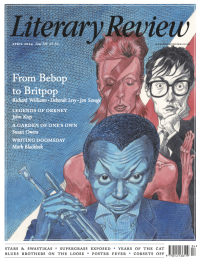Ben Wilson
Scribblers with a Cause
Writing on the Wall: Graffiti, Rebellion and the Making of Eighteenth-Century Britain
By Madeleine Pelling
Profile 333pp £25
The medium by which meetings were arranged, debts and wagers settled, tabs in taverns recorded, jokes made and insults spelt out: chalk markings were everywhere in the 18th-century cityscape. Chalk is washed away soon enough, alas, and the message will be scrubbed clear forever unless someone thinks fit to record it on paper. In 1731, the pseudonymous Hurlo Thrumbo purported to do just this in a book called The Merry-Thought; or, The Glass-Window and Bog-House Miscellany, which Madeleine Pelling describes as a ‘cacophonous collection of graffiti found across London’s coffeehouses, taverns, streets and … privies’.
Joyously scatological, The Merry-Thought captures the spontaneity of graffiti and its irreverence. ‘There’s Nothing foul that we commit,’ goes one example, ‘But what we write, and what we “sh—t”.’ It also conveys the to-and-fro of graffiti, and the urge to answer back. Underneath a bitter outpouring of woe from someone who had lost everything in the South Sea Bubble, another person scrawled, ‘I have got what he lost/I am gay while he’s cross’d’, followed by a malevolent ‘Ha! Ha! Ha!’
Is it too good to be true? Perhaps. But we know from other sources that chalked messages were common. Chalk converted, in Pelling’s words, ‘the nation’s surfaces [into] crucial battlefields’ during times of political unrest. One of the most succinct chalk messages was communicated by the number 45. This was

Sign Up to our newsletter
Receive free articles, highlights from the archive, news, details of prizes, and much more.@Lit_Review
Follow Literary Review on Twitter
Twitter Feed
Few writers have been so eagerly mythologised as Katherine Mansfield. The short, brilliant life, the doomed love affairs, the sickly genius have together blurred the woman behind the work.
Sophie Oliver looks to Mansfield's stories for answers.
Sophie Oliver - Restless Soul
Sophie Oliver: Restless Soul - Katherine Mansfield: A Hidden Life by Gerri Kimber
literaryreview.co.uk
Literary Review is seeking an editorial intern.
Though Jean-Michel Basquiat was a sensation in his lifetime, it was thirty years after his death that one of his pieces fetched a record price of $110.5 million.
Stephen Smith explores the artist's starry afterlife.
Stephen Smith - Paint Fast, Die Young
Stephen Smith: Paint Fast, Die Young - Jean-Michel Basquiat: The Making of an Icon by Doug Woodham
literaryreview.co.uk